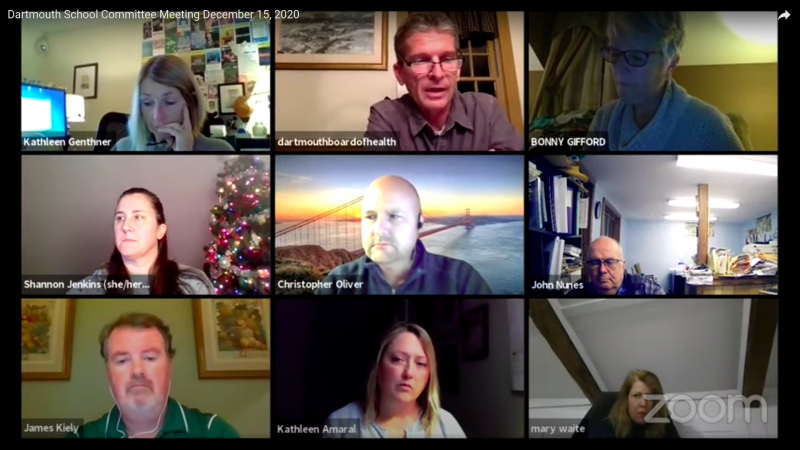Dartmouth Schools may return to fully remote learning in January
Students in the Dartmouth Public Schools may not be coming back to in-person learning in January after the School Committee discussed Dartmouth’s increasing Covid rates at an emergency meeting on Dec. 15.
At the meeting, Public Health Director Chris Michaud warned the committee that the town continues to see widespread community transmission of the virus.
Although he noted that this week’s case numbers may be down due to a drop in testing — including a recent shift to appointment-only tests at a large New Bedford drive-thru site — he urged the public not to take an apparent decline as “reason to relax.”
“I don’t think those numbers are going to be representative of transmission in Dartmouth,” Michaud said.
He pointed to the near-doubling of the state’s number of Covid infections in the first week of December due to the Thanksgiving surge, adding that businesses in town are now required to call the health department when an employee tests positive.
“The number of calls coming in over the last seven to nine business days has been unprecedented,” he said. “This is a barometer of what is truly going on in the community.”
Michaud noted that there are few clusters of infections within the schools, with most cases coming from outside the school community.
“I believe that schools are our safest place right now,” he said. “You’ve done an amazing job.”
Yet Michaud went on to state that the next few weeks will likely see more transmission as families come together for the holidays, as they did at Thanksgiving. “I think January’s gonna be tough as well,” he said.
School Committee members weighed whether to go to fully remote learning “sooner rather than later,” as committee chair Chris Oliver put it.
With just a few days left before the winter break, none of the officials seemed to support immediately moving to remote learning. Oliver suggested a remote start in January, with a staggered return to school.
Committee member John Nunes suggested a wait-and-see approach. “Our schools are not a spreader,” he said. “If something happens and we have to shut down later, then we do that.”
“The more that [students] can be in school face to face, the better off they are,” he added.
“I know the huge costs that are on both sides of this equation,” noted vice chair Dr. Shannon Jenkins, adding, “We signed up for hybrid learning when the rate of community spread was maybe about five cases, 10 cases a week.”
“Everyone in this community...should leave for winter break prepared that they may not be coming back in January,” she stated.
“I would like to see our staff have advance notice,” said member Mary Waite.
Dr. Jenkins agreed. “If we pull the plug right now, families are going to be scrambling for child care,” she said.
Schools administrators acknowledged that a return to fully remote learning could mean union contract issues in the future, while Michaud noted that winter sports practices will add another layer of complexity to contact tracing over the break.
Superintendent of Schools Dr. Bonny Gifford said that the state’s education board is promoting as much in-school learning as possible. “The social-emotional issue is enormous,” she noted.
“To me, safety is paramount,” said Oliver. “Safety is the number one priority when it comes to students in this district, including my own student.”
Committee members said they will likely make a decision on a return to remote learning at their next regular meeting on Dec. 21, or during the winter break.













